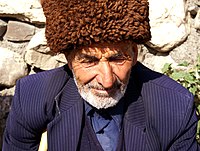35:
20:
139:. Akaev linked the development of these courts to the rekindling of Kyrgyz national identity. In a 2005 speech, he connected the courts back to the country's nomadic past and extolled how the courts expressed the Kyrgyz ability of self-governance.
72:
until the Soviet times. Acting as advisors or judges, these elders have or had a role in politics and the justice system in countries and tribes. For instance, there are
245:
170:
235:
230:
225:
131:
courts were eventually included under
Article 92 of the Kyrgyz constitution. As of 2006, there were approximately 1,000
220:
117:
192:
Judith Beyer, Kyrgyz
Aksakal Courts: Pluralistic Accounts of History, 53 J. OF L. PLURALISM 144 (2006)
34:
240:
53:
19:
174:
56:) metaphorically refers to the male elders, the old and wise of the community in parts of
214:
148:
65:
127:
courts. The courts would have jurisdiction over property, torts and family law. The
167:
120:
57:
89:
81:
77:
61:
28:
136:
84:, which has traditionally been a more urban society (the Uzbeks being
33:
18:
39:
69:
68:. Traditionally, an aqsaqal was the leader of a village or
135:
courts throughout
Kyrgyzstan, including in the capital of
8:
201:Former President Akaev, quoted in Beyer,
188:
186:
160:
123:announced a decree to revitalize the
7:
52:(literally meaning "white beard" in
16:Elderly men in the Turkish society
14:
104:who acts as the district leader.
88:or town-dwellers, as opposed to
92:), cities are divided up into
1:
179:Encyclopedia of Central Asia
262:
246:Customary legal systems
118:President of Kyrgyzstan
42:
31:
236:Culture of Kazakhstan
231:Culture of Uzbekistan
226:Culture of Kyrgyzstan
203:Kyrgyz Aksakal Courts
108:Redevelopment of the
37:
22:
112:courts in Kyrgyzstan
173:2012-06-12 at the
43:
32:
221:Culture of Turkey
54:Kipchak languages
253:
205:
199:
193:
190:
181:
165:
261:
260:
256:
255:
254:
252:
251:
250:
211:
210:
209:
208:
200:
196:
191:
184:
175:Wayback Machine
166:
162:
157:
145:
114:
38:Aqsaqal near a
17:
12:
11:
5:
259:
257:
249:
248:
243:
238:
233:
228:
223:
213:
212:
207:
206:
194:
182:
159:
158:
156:
153:
152:
151:
144:
141:
116:In 1995, then-
113:
106:
15:
13:
10:
9:
6:
4:
3:
2:
258:
247:
244:
242:
239:
237:
234:
232:
229:
227:
224:
222:
219:
218:
216:
204:
198:
195:
189:
187:
183:
180:
176:
172:
169:
164:
161:
154:
150:
149:Customary law
147:
146:
142:
140:
138:
134:
130:
126:
122:
119:
111:
107:
105:
103:
99:
95:
91:
87:
83:
79:
75:
71:
67:
66:Bashkortostan
63:
59:
55:
51:
47:
41:
36:
30:
26:
21:
202:
197:
178:
163:
132:
128:
124:
121:Askar Akayev
115:
109:
101:
97:
93:
85:
73:
58:Central Asia
49:
45:
44:
24:
215:Categories
155:References
82:Uzbekistan
78:Kyrgyzstan
76:courts in
168:"Kishlak"
241:Caucasus
171:Archived
143:See also
94:mahallas
74:aksakals
62:Caucasus
29:Khinalug
137:Bishkek
133:aqsaqal
129:aqsaqal
125:aqsaqal
110:aqsaqal
102:aqsaqal
100:has an
98:mahalla
96:. Each
50:aksakal
46:Aqsaqal
25:aqsaqal
90:Yörüks
60:, the
86:sarts
80:. In
27:from
64:and
40:yurt
70:aul
48:or
23:An
217::
185:^
177:,
Text is available under the Creative Commons Attribution-ShareAlike License. Additional terms may apply.

